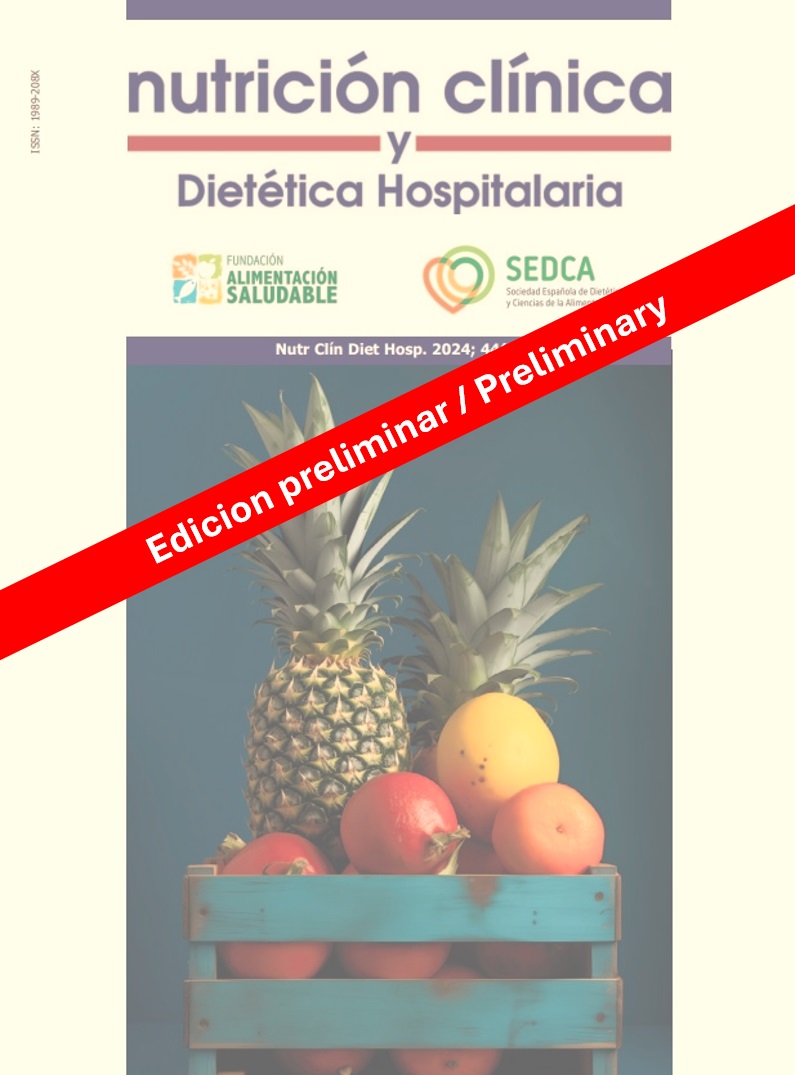Eating habits, symptoms, and underlying diseases associated with small intestinal bacterial overgrowth (SIBO): A study in private practice in Bizkaia.
DOI:
https://doi.org/10.12873/Keywords:
SIBO, dietary habits, gastrointestinal symptoms, gastritis, gastroesophageal reflux, breath testAbstract
Nowadays, small intestinal bacterial overgrowth (SIBO) is a gastrointestinal condition linked to various digestive, nutritional, and metabolic disorders. This microbial imbalance can impair nutrient absorption, leading to vitamin deficiencies and disruptions in the digestive tract. Common symptoms include bloating, diarrhea, abdominal pain, and fatigue, all of which significantly impact patients' quality of life. Additionally, SIBO is often associated with underlying conditions such as irritable bowel syndrome (IBS), inflammatory bowel disease (IBD), celiac disease (CD), and diabetes mellitus (DM), among others.
Objective: To evaluate the eating habits, symptoms, and associated diseases in patients diagnosed with SIBO.
Materials and Methods: A cross-sectional descriptive study was conducted with a sample of 34 patients diagnosed with SIBO through lactitol breath tests. Data on symptoms and food frequency were collected. Statistical analyses included Chi-square, Spearman correlation, and Kruskal-Wallis tests, with a 95% confidence interval.
Results: The most frequently consumed foods among patients were fruits (mean: 34.75 ±29.80) and vegetables (mean: 19.54 ±15.04), while the least consumed were pastries (mean: 9.56 ±15.98) and fish (mean: 8.29 ±12.95). Significant associations were identified between meat consumption and diseases such as gastritis and gastroesophageal reflux disease (GERD) (p=0.031), as well as between legume consumption and combined symptoms (p=0.006).
Conclusions: The findings underscore the influence of dietary patterns on symptoms and diseases associated with SIBO, highlighting the importance of personalized dietary approaches. This study provides valuable data for designing nutritional management strategies to optimize the quality of life for patients with SIBO.
References
Guarner F. Papel de la flora intestinal en la salud y en la enfermedad [Internet]. Vol. 22, Nutr Hosp. scieloes; 2007. p. 14–9. Available from: http://scielo.isciii.es/scielo.php?script=sci_arttext&pid=S0212-16112007000500003&lng=es.
RB S. Microbial Influences in Inflammatory Bowel Diseases. Gastroenterol [Internet]. 2008;134(2):577–94. Available from: https://pubmed.ncbi.nlm.nih.gov/18242222/
OMS. Enfermedad inflamatoria ntestinal [Internet]. Ginebra. 2024. Available from: https://platform.who.int/data/
Bellini M, Tonarelli S, Nagy AG, Pancetti A, Costa F, Ricchiuti A et al. Low FODMAP Diet: Evidence, Doubts, and Hopes. Nutrients [Internet]. 2020;12(1):148. Available from: https://www.mdpi.com/2072-6643/12/1/148
El-Salhy M, Hatlebakk JG HT. Diet in Irritable Bowel Syndrome (IBS): Interaction with Gut Microbiota and Gut Hormones. Nutrients [Internet]. 2019;11(8). Available from: https://pubmed.ncbi.nlm.nih.gov/31394793/
Instituto Vasco de Estadística. Hospitalizaciones en los hospitales de la C.A. de Euskadi por diagnóstico principal, según titularidad. [Internet]. EUSTAT. 2022 [cited 2024 Jul 28]. Available from: https://www.eustat.eus/estadisticas/tema_16/opt_0/ti_estado-de-salud/temas.html#cb
Sroka N, Rydzewska-Rosołowska A, Kakareko K, Rosołowski M, Głowińska I HT. Show Me What You Have Inside-The Complex Interplay between SIBO and Multiple Medical Conditions-A Systematic Review. Nutrients [Internet]. 2022;15(1):90. Available from: https://doi.org/10.3390/nu15010090
Feng X LX. The prevalence of small intestinal bacterial overgrowth in diabetes mellitus: a systematic review and meta-analysis. Aging (Albany NY) [Internet]. 2022;14(2):975–88. Available from: https://pubmed.ncbi.nlm.nih.gov/35086065/
Lucas Zapata P, García Navarro E RKC. Dieta baja en FODMAP. An pedi [Internet]. 2024;101(1):36–45. Available from: https://www.sciencedirect.com/science/article/pii/S1695403324000912
Álvarez G GF. Microbiota, probióticos y prebióticos. Evidencia científica [Internet]. ERGON. Álvarez G GF, editor. SEMiPyP (Sociedad Española de microbiota, probióticos y prebióticos; 2020. 22–23 p. Available from: https://doi.org/10.3390/microorganisms11030573
Feng X LX. The prevalence of small intestinal bacterial overgrowth in diabetes mellitus: a systematic review and meta-analysis. Aging (Albany NY) [Internet]. 2022;14(2):975–88. Available from: https://doi.org/10.18632%2Faging.203854
Liao L, Su BB XS. Helicobacter pylori infection and small intestinal bacterial overgrowth: a systematic review and meta-analysis. BMC Microbiol [Internet]. 2023;23(1). Available from: https://pubmed.ncbi.nlm.nih.gov/38053022/
Gandhi A, Shah A, Jones MP, Koloski N, Talley NJ, Morrison M, et al. Sobrecrecimiento bacteriano metano positivo en el intestino delgado en la enfermedad inflamatoria intestinal y el síndrome del intestino irritable: una revisión sistemática y metanáli. Gut. [Internet]. 2021 [cited 2023 May 27];13(1). Available from: https://www.tandfonline.com/doi/abs/10.1080/19490976.2021.1933313
Martínez Vázquez SE, Nogueira de Rojas JR, Remes Troche JR, Coss Adame E, Rivas Ruiz R UDL. Importancia de la intolerancia a la lactosa en individuos con síntomas gastrointestinales. Gastroenterol [Internet]. 2020;85(3):221–331. Available from: https://www.sciencedirect.com/science/article/pii/S037509062030046X
Sachdev AH PM. Gastrointestinal bacterial overgrowth: pathogenesis and clinical significance. Ther Adv Chronic Dis [Internet]. 2013;4(5):223–31. Available from: https://journals.sagepub.com/doi/pdf/10.1177/2040622313496126
Varjú P, Ystad B, Gede N, Hegyi P, Pécsi D, Czimmer J. The role of small intestinal bacterial overgrowth and false positive diagnosis of lactose intolerance in southwest Hungary-A retrospective observational study. PLoS One [Internet]. 2020 May 1 [cited 2023 Apr 23];15(5). Available from: https://pubmed.ncbi.nlm.nih.gov/32384113/
Quigley EMM, Murray JA, Pimentel M. AGA Clinical Practice Update on Small Intestinal Bacterial Overgrowth: Expert Review. Gastroenterology. 2020 Oct 1;159(4):1526–32.
Wang J, Zhang L HX. Efficacy of rifaximin in treating with small intestine bacterial overgrowth: a systematic review and meta-analysis. Expert Rev Gastroenterol Hepatol [Internet]. 2021;15(12):1385–99. Available from: https://doi.org/10.1080/17474124.2021.2005579
Reference Laboratory SA. GastroRef Test Kit: Test de aliento para el sobrecrecimiento bacteriano del intestino delgado (SIBO) e intolerancia a azúcares. Barcelona; 2023.
Goni L, Aray Miranda M, Martínez JA CM. Validación de un cuestionario de frecuencia de consumo de grupos de alimentos basado en un sistema de intercambios. Nutr Hosp [Internet]. 2016;33(6):1391–9. Available from: https://pubmed.ncbi.nlm.nih.gov/28000471/
Downloads
Published
License
Copyright (c) 2025 Nutrición Clínica y Dietética Hospitalaria

This work is licensed under a Creative Commons Attribution-NonCommercial-NoDerivatives 4.0 International License.
Los lectores pueden utilizar los textos publicados de acuerdo con la definición BOAI (Budapest Open Access Initiative)



